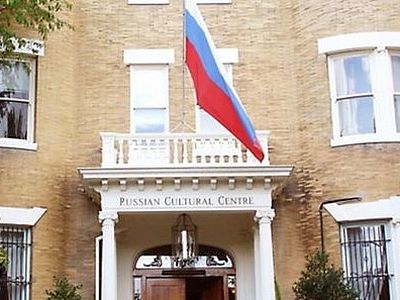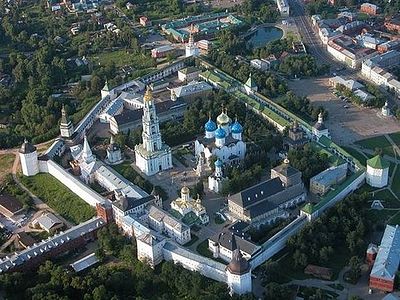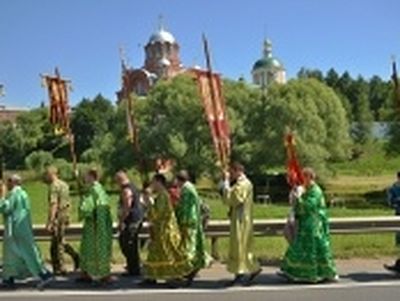In honor of the 700th year since of the birth of St. Sergius of Radonezh
Undoubtedly, the most outstanding establisher of the truly selfless “life equal to the angels” in fourteenth century Russia is St. Sergius of Radonezh, the founder of the famous Holy Trinity-St. Sergius Monastery, which embodies in its historical legacy his blessed precepts, and gradually became a kind of spiritual heart for all of Orthodox Russia.
The significance of this monk, humble yet great in his love for God, to the Christian enlightenment of Ancient Russia and to the tangible manifestations of the ideal of Holy Russia is difficult to overestimate. It is no wonder that the fourteenth century is called the century of St. Sergius, the only monk—owing to the grateful memory of the people—who is referred to as the “Abbot of the Russian land”, the “vigilant guardian of the Russian people.” The famous historian Vasily Klyuchevsky writes of him: “The name of St. Sergius reminds people of their moral renewal, making possible also their political renewal, and teaching the precept that political strength is only sound when it rests on a moral foundation. This renewal and this precept are St. Sergius’s most valuable contributions. They are not historical or theoretical, but rather housed in the living soul of the people, in its moral fiber.”[1]
In the Orthodox consciousness, the brightest examples of a harmonious human personality are connected with the figure of St. Sergius of Radonezh, living “by the law of Christ”—humbly wise, warmly merciful toward every man and every creature, yet without the weakness of sentimentalism; always active, hardworking, whether it be in the work of everyday life or in deep prayer. All of these qualities of the Christian worldview truly came together in the abbot of the Holy Trinity monastery—an ideal example of holiness who called us to true unity and brotherhood in Christ.
It is known that the Orthodox consciousness of ancient Russia—especially during the time of the great elder Sergius—always recognized the ultimate symbolic expression of unity to be the indivisible unity of the Divine Persons: the Father, Son, and Holy Spirit, in God the Holy Trinity. To St. Sergius, unlike to anyone before him in ancient Russia, had been revealed through his monastic strivings this “divine” or “celestial”, most heavenly mystery of the Trinity as a mystery of Divine Love, whose tireless worshipper and preacher he remained for the course of his entire life.
The exact date of St. Sergius’s birth, at which he was given the name Bartholomew, is unknown. It is believed that he was born between 1313/14 and 1322 in the village of Varnitsa near Rostov the Great. Eventually, the Holy Trinity-Varnitsa Monastery was founded in honor of the abbot of Radonezh.
Soon, however, Bartholomew and his parents moved to the village of Radonezh (or Gorodok), located outside of Moscow not far from the Pokrov Monastery of Khotkovo, which after many years of neglect was restored in 1989.
It is here that the saint in his childhood experienced a wondrous meeting with a messenger from the angelic kingdom, appearing to him as an elder, and miraculously bestowing through his blessing the special ability for “book learning.” Epiphanius the Wise, a disciple of St. Sergius who devoutly collected information about him and composed his detailed Life in 1417-18, says that the future saint, then still a boy, was once sent by his father to "look after the cattle" and unexpectedly “met a monk, a venerable elder, a marvel and stranger, with the dignity of a priest, friendly and with the appearance of an angel. This stranger was standing beneath an oak tree, praying devoutly and with much shedding of tears.”[2] This monk “called him to his side, blessed him, kissed him in the name of Christ, and asked: ‘What are you seeking, or what do you want, child?’ The boy said: ‘My soul desires above all to know how to read and write, for which I was sent to study. Now my soul aches, because I practice reading and writing but cannot manage to learn. Will you, holy father, pray to God for me, that He will give me understanding of book learning?’
“The elder raised his hands and eyes toward heaven, sighed, prayed to God, and said, ‘Amen.’ He took out from his satchel what appeared to be small piece of white wheat bread prosphora, as if it were some treasure, and with three fingers handed it to the boy, saying to him, ‘Open your mouth, child. Take this and eat. It is given to you as a sign of God's grace and for the understanding of the Holy Scriptures. Though the gift appears but small, its taste is very sweet. [...] Do not worry about book-learning: you will find that from this day forth the Lord will give you learning above that of your brothers and others of your own age.’ And he received it for the benefit of his soul.”[3]
The boy then brought the wondrous guest home to his parents, who loved to receive wandering pilgrims. They offered the monk food, but first he took Bartholomew to the chapel, where he "began reciting the Canonical Hours, telling the boy to read the Psalms. The boy said, ‘I cannot, Father.’ The monk replied, ‘I told you that from this day the Lord would give you knowledge of reading and writing. Read the Word of God without doubting.’ At this something wondrous occurred: Receiving the monk's blessing, the boy began to recite very well and harmoniously, and from that hour he could read.”[4]
After the meal, the monk turned to the parents of the saint with these prophetic words: “‘Rejoice and be glad that you gave birth to this child, whom God chose before his birth... Here are my last words and then I will be silent. There will be a sign of the truthfulness of my words: After my departure you will see that the boy knows book learning well and remembers all the Holy Books. And here is my second sign and prediction for you: The boy will be great before God and man for his godly life.’ Having said this the monk departed, speaking an obscure saying to them: ‘Your son will serve the Holy Trinity and will lead many to an understanding of the divine precepts.’ After saying this, the elder departed from them. The parents accompanied him to the doorway of their house, where he suddenly disappeared.
“Perplexed, they wondered if he had been an angel sent to give the boy knowledge of reading.”[5]
In 1337, Bartholomew’s parents as well as his older brother Stephan took monastic vows. However, soon after the death of his father and mother—the holy schemamonk Kirill and schemanun Maria, canonized in 1992—the future great monk and his brother Stephan settled several versts from Radonezh in the deep forest near Makovets hill, where the Holy Trinity-St. Sergius Monastery is located today.
Hard labor and a life of semi-starvation, the extreme conditions of living alone in the wilderness of Radonezh, and at the same time unceasingly praying the Jesus Prayer (“Lord Jesus Christ, Son of God, have mercy on me, a sinner”) tempered the young hermit, who relied entirely on God alone.
At the age of 23-25, he accepted monasticism with the name Sergius. By that time the monk had already acquired respect in monastic spheres, and like-minded ascetics had gradually begun to flock to him, “seeking the heavenly city.” When the number of monks coming to Sergius reached the apostolic number of 12, they constructed a fence around the forest settlement, and thus in ancient Russia emerged a new monastery, with a wooden church in the name of the Holy Life-Giving Trinity. Sergius became the abbot at the general request of the monks.
In the beginning the monastery was “eremitic”, and each monk lived there by his own means. In fact, they only gathered together for church services. But in 1354, a “common living” charter came into effect, which soon also began to be applied in many monasteries founded by disciples of the great elder. Thus began the epoch of the Holy Trinity Monastery abbot’s spiritual and moral influence on Russian society.
St. Alexis [Metropolitan of Moscow] truly esteemed the saint and even suggested to Sergius that he become his successor to the metropolitanate, which Sergius humbly but firmly refused. Possessing a relentless and “bleeding heart” for the difficult fate of his native land, with the blessing of Metropolitan Alexis this simple monk from Radonezh went repeatedly to Rostov, Nizhny Novgorod, and later to Tver and Ryazan, where he humbled the princes who were marching on Moscow, transforming their fierceness into humility. His personal authority were so great that when his quiet and meek words were of no effect, he would even close a church in punishment and suspend the customary course of church life, as happened, for example, in Nizhny Novgorod due to the antagonism between Moscow and Prince Boris of Suzdal, who ruled that city at the time.[6]
Of St. Sergius’s spiritual role in the revival of ancient Russia, the renowned writer of the early twentieth century, Boris Zaitsev, said beautifully, “By nature he was not at all a politician—not in the Church nor in the state. But fatefully, his entire life and that of the Lavra was intertwined with the fate of Russia at the time. He was a participant in all of its suffering and joy. Not being in a position of power even in the Church, he unfailingly supported Rus' with his words, example, and prayer. It happened naturally, because St. Sergius was a man of his epoch, a representative of the times. [...] Sergius was the sweet-speaking child of the North. Coolness, forbearance, and gentle tranquility, the harmony of soft-spoken words and holy acts comprised the unique character of this Russian saint. Sergius is profoundly Russian and profoundly Orthodox. In him is the quality of the resin of northern Russia: a pure, strong, and wholesome type of it. [...] Looking at his character, you feel it: yes, Russia is great. Yes, holy strength was given to it. Yes, we can live if strength and truth are near.
“In onerous times of bloodshed, violence, savagery, treachery, and baseness, the glorious figure of St. Sergius assuages and strengthens. Not having left any writings of his own, it would seem that Sergius did not teach anything. But it is precisely through his presence that he teaches: to one he is solace and renewal, to another his is a silent reproach. St. Sergius silently teaches the most simple things: truth, sincerity, manhood, work, piety, and faith.”[7]
Indeed, the selfless ascetic path of the Holy Trinity abbot completely corresponds with such a grateful and absolutely true estimation of his inimitable, at the same time both stern and charismatic personality.
According to his biographer, who was his close contemporary, Sergius always lived as if in parallel worlds, both “above” and here “below.” In the “thinnest of garments” he built for himself a modest monastic cell, eating meagerly from the charity of wealthier brethren, yet by the power of his prayer he brought forth a source of water from the earth. Like a simple peasant he tilled the garden, yet he bore witness to the descent of heavenly fire into the Eucharistic chalice on the altar table. He rejoiced at the arrival of any peasant or the lowest beggar, yet with reverence he encountered the Mother of God herself, together with the Apostles Peter and John, who visited his modest habitation. He was also a visionary who received a vision of the mysteries of the heavenly world, and an experienced teacher to his brethren, for he was able to keenly discern the struggles with sin in men’s hearts. He was “at home” even in the joyfully bright angelic realm, but he was just as inalienably a part of the tribulations encompassing his native land.
This internal Christian completeness of Sergius' person also became fertile ground for the miraculous gift of prophecy that was so visibly manifest in his prediction to the Great Prince Dmitry of his victory over the Tatars at the Kulikovo Field. Thus, it is totally natural that those who received his blessing for this frightful battle and achieved its victory forever preserved the memory of the great elder as their spiritual captain, the eternal protector of Holy Russia, and its tireless apostle before God.
The entire life of Saint Sergius was like a constant, more often silent, but no less eloquent, calling to communion with God and Christian love. This calling consequently found utterly complete yet also brief expression in his unique “written testament,” which iconographers frequently place in iconic representations of the saint in the text of a scroll, carried in his hand: “Brethren, be attentive to yourselves. Have first the fear of God, purity of soul, and unhypocritical love; moreover, hospitality, and humility.” In this brief exhortation is expressed the whole essence of St. Sergius’s testament to his spiritual descendants. This is what he mainly taught, and that is what the people mainly remember.
From the forthcoming book Ancient Russia in Christ: A Study of the History of Orthodoxy in Russia (Sretensky Monastery).
[1] V. O. Kliuchevsky, “The Significance of St. Sergius for the Russian People and State.” V.O. Kliuchevsky, “Aphorisms. Historical Portraits and Sketches”, Diaries (Moscow, 1993), 105-106.
[2] The Life of St. Sergius of Radonezh // Literary Monuments of Ancient Russia. 14th through mid-15th century (Moscow, 1981), 281.
[3] Ibid., 281, 283.
[4] Ibid., 283.
[5] Ibid., 285, 285.
[6] Cf.: E. E Golubinksy, The Venerable Sergius of Radonezh and the Lavra Created by Him // The Life of St. Sergius of Radonezh (Moscow, 1999) 185.
[7] B.K. Zaitsev, Saint Sergius of Radonezh / / The Life of Saint Sergius of Radonezh, 240-241.




